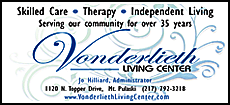|
That's the good news, and it's been evolving over decades.
Until recently, however, that positive change has come with a less
happy corollary: More aging Americans are entering long-term care
facilities, where they cope with basic issues of dignity such as
incontinence, and independence, like the ability to choose their own
waking and meal times.
The need to address the issues of dignity and independence is
spurring change in the health care and extended care communities.
"With people living so much longer, a sea change is occurring in
the health care community, and especially among providers of
extended care," says Dan Love, president of the personal care
division for Medline Industries, Inc. "The focus is shifting away
from simply extending life and toward a greater emphasis on
enhancing quality and maintaining dignity in the later years of
life."
To better preserve the dignity of those in long-term care, a
culture change movement is afoot in long-term care facilities, which
is good news for older Americans. Today's long-term care facilities
are transforming services for older adults through better attention
to patient-directed values that include choice, dignity, respect,
self-determination and purposeful living, according to the Pioneer
Network, a not-for-profit advocacy group.

"The resident-centered care in long-term care encompasses nearly
every aspect of life, from simple things like incontinence products
that fit properly, to allowing residents to determine when they
would like to get up in the morning and have dinner at night," Love
says. "These changes focus on preserving an individual's dignity and
autonomy as much as possible."
In fact, incontinence is a good example of a simple, yet
pervasive need that directly impacts an individual's sense of
dignity. More than half of all nursing home residents are
incontinent, and it's the second-leading cause of
institutionalization, according to the National Association for
Incontinence. Yet in the past, incontinence products have been
little more than extra-large diapers that did little to preserve an
individual's dignity.
Demand for better-fitting products prompted Medline to develop a
new design in adult briefs. FitRight provides a more comfortable,
garment-like fit, with odor protection and leak guards that enhance
the wearer's dignity, mobility and independence. Visit
www.medline.com/pages/fitright to learn more about incontinence
products.
[to top of second
column] |
 "By switching to better-fitting, discreet and more absorbent
incontinence products, facilities have taken steps toward mitigating
the embarrassing effects of this issue," Love says. "It's a good
example of how facilities are emphasizing the need to listen to --
and respond to -- residents' needs and concerns."
With Americans living longer, that means there will be a lot more
of them. About 13 percent of the population (nearly 40 million
people) are 65 or older, according to the U.S. Census Bureau. By
2030, that number is expected to rise to 72 million, or nearly one
in five Americans; and the need for quality extended care facilities
and products like FitRight will almost certainly rise with that
number.
If you need to seek extended care for a loved one, the Pioneer
Network offers some advice on how to evaluate whether a facility is
on board with, and acting on, the concept of patient-directed care.
The organization recommends you ask these questions:
-
How will they get
to know your family member? -- The facility may have a
questionnaire to gather information about your loved one, and
should be prepared to spend time with you and the patient to
learn about their preferences, past, current interests, goals
and wishes for the future.
-
Will your family
member be able to choose his or her own wake-up and meal times?
-
Will your loved
one be able to choose to have a shower or bath, and when that
will happen?
-
What recreational activities will be
available?
"Every day, we're learning more about how to extend life," Love
says. "Now, the challenge is to ensure that extra time is lived with
the most dignity and best quality possible. Extended care facilities
are finding that they can achieve that goal, often by taking some of
the simplest steps."
[Copy of article from
ARAcontent] |